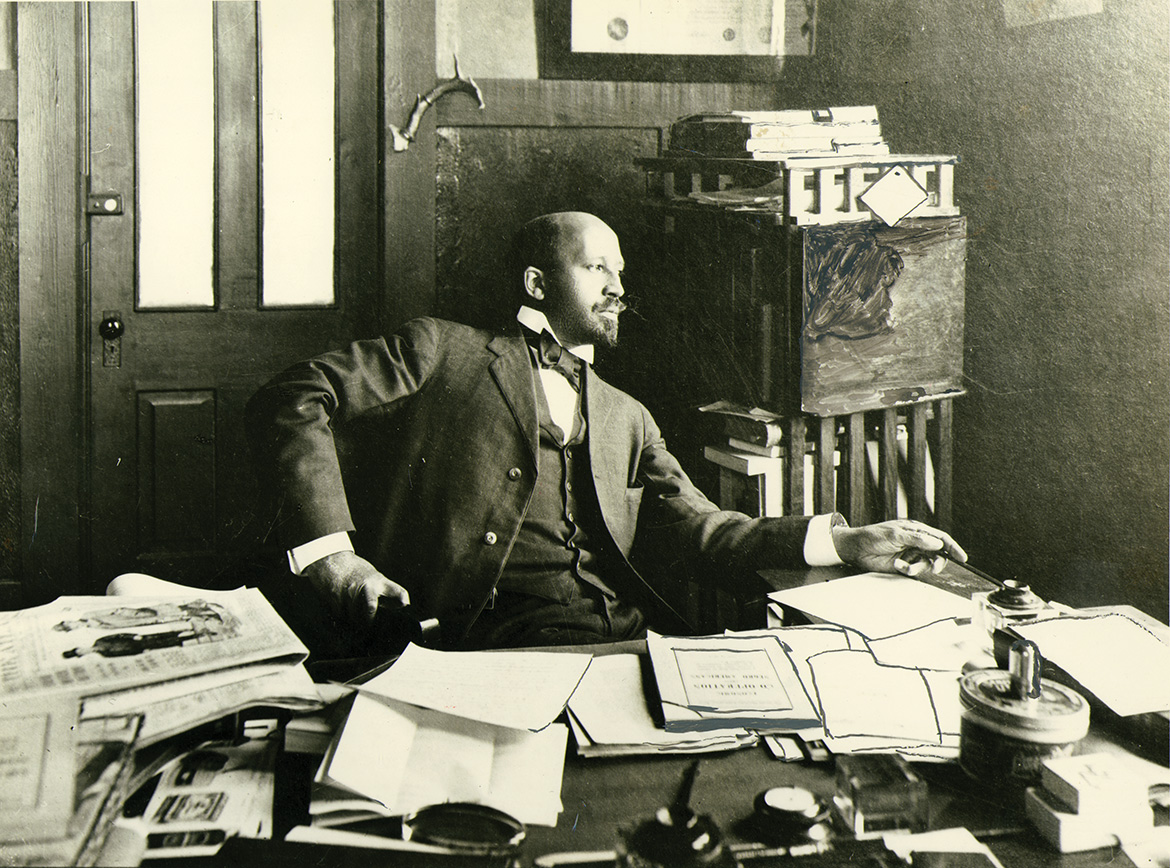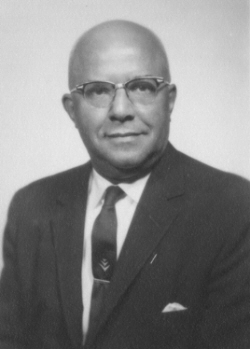Solidarity and Excellence: W.E.B. Du Bois and William Leo Hansberry

In W. E. B. Du Bois’s The World and Africa, first published in 1946, he writes: “I have read Eduard Meyer’s Geschichte des Altertums (1910-1913); but of greatest help to me has been Leo Hansberry.” Such an affectionate show of gratitude may have been satisfactory. However, the note continues: “Mr. Hansberry, a professor at Howard University, is the one modern scholar who has tried to study the Negro in Egypt and Ethiopia. I regret that he has not published more of his work. The overwhelming weight of conventional scientific opinion on Africa has overawed him, but his work in manuscript is outstanding.” Finally, Du Bois tells the reader that he has relied heavily on Hansberry’s work for the sixth chapter of his own book, entitled “The Land of the Burnt Faces.”
Much is made of the individual achievements of scholars, single-authored publications, and conference plenary sessions of the scholar’s life in the academy. These successes often overshadow the extensive collaborations, shared documents, unsolicited leads, and materials loaned by comrade-scholars that make a publication or a career possible. Such is the case of William Leo Hansberry and W. E. B. Du Bois. While Du Bois remains an almost unparalleled intellectual giant he greatly benefited from the work of Hansberry, who was one of the foremost leaders in the development of African Studies in the United States.
Scholars interested in the intellectual history of African Studies in the U. S. will undoubtedly come across the works of William Leo Hansberry. The historian Joseph E. Harris has done the most work recovering Hansberry’s oeuvre and signature role in the early African Studies movement in the United States. Harris’s work led to the publication of two collections of Hansberry’s writings; Pillars in Ethiopian History (1974) and Africa and Africans as Seen by Classical Writers (1975), published as the William Leo Hansberry African History Notebook in two volumes. Additionally, the historian, archivist, and past chair of the history department at Howard University, Lorraine A. Williams republished Hansberry’s 1963 inaugural speech “Africana at Nsukka” in her edited collection Africa and the Afro-American Experience: Eight Essays (1981), which remains a pivotal collection of historiography on Africa by prominent Black historians. Hansberry served one year as the director of the Institute of African Studies at the University of Nigeria in Nsukka. His former student Nnamdi Azikiwe opened the institute in Hansberry’s honor.
Hansberry began his intellectual exploration in the 1920s at a time when the academic study of African people was in the custody of European travelers, diarists, missionaries and scholars bent on colonization. His early studies of African history enabled him to offer a range of courses at Howard University including, “Negro Peoples in the Civilizations of the Prehistoric and Ancient World” and “Negro Civilizations in West Central Africa from A.D. 1000 to the End of the Nineteenth Century.” Harris notes that Hansberry hosted a symposium on “Cultures and Civilizations of Negro People in Africa” at Howard University as early as 1925, demonstrating that from the earliest beginnings Hansberry understood what Harris would later call the global dimensions of the African diaspora.
Hansberry was known as an expert and dedicated teacher, which partially explains why he published relatively little in his long and pioneering career. Aside from Du Bois’s note acknowledging Hansberry’s impact, not much is known of their relationship and the spirit of collegiality they portrayed. However, Du Bois’s papers at the University of Massachusetts Amherst include correspondence with Hansberry, offering a sense of their relationship, mutual admiration, and shared dedication to writing the history of the African world.

It is not certain the exact moment that Hansberry met Du Bois. However, Du Bois encouraged him to attend Harvard, where he earned the B.A. in 1921, and the M.A. in 1932. The demands of teaching and travel forced him to stretch his time between degrees. During this period he deeply immersed himself in African history, anthropology, and geology, which allowed him to offer early courses at Howard University. Before arriving at Howard, Hansberry taught at Straight College, an HBCU established in New Orleans by the American Missionary Association after the Civil War. While on this teaching appointment he received notice that he was awarded a Winthrop Fellowship in Anthropology back at Harvard for the academic year 1921-22. He wrote to Du Bois with excitement and thanked Du Bois for recommending him for the fellowship. Du Bois replied with a mentor’s satisfaction and with advice that Hansberry schedule a series of lectures, as he might be able to support his income and “make the thing go.” Following the Harvard fellowship, he was hired at Howard and quickly began building an African history program.
Du Bois continued to correspond with Hansberry and regularly requested new material or inquired about his new projects on Africa throughout the 1930s. Hansberry was eager to meet his mentor’s requests and informed Du Bois that he was at work on two main projects, “Imperial Ethiopia in Antiquity,” and “Imperial Ethiopia in the Middle Ages.” Du Bois would rely on these subjects while composing The World and Africa, published over a decade after Hansberry began this work. Hansberry also expressed pleasure at learning of Du Bois’s plans to produce an “Encyclopedia of the Negro” in this period and shared his own plans for what he might contribute. Throughout the 1930s and 1940s, Du Bois and Hansberry continued to exchange ideas. Their collaboration informed Hansberry’s work as an intellectual-organizer of the Ethiopian Research Council in the 1930s, which aimed at rescuing Ethiopian history from Italian imperialist occupation and erasure.
In preparation for the Fifth Pan-African Congress in 1945, Du Bois addressed a letter to Hansberry requesting his attendance at a “Colonial Conference,” ostensibly a meeting to strategize toward Manchester that October. Du Bois invited Hansberry and sent along the proposed agenda. Hansberry wrote back that he was bogged down in work at Howard and unfortunately could not attend the April conference. While Hansberry was far from a detached scholar, he had his hands full with a university that had not been eager to support his path-breaking work over the decades. His determination to make Howard a first-rate site of African scholarship eventually carried the day, though he was not able to reap all the benefits of his intellectual organizing. While the frequent exchanges cooled off in the late forties, Hansberry stuck by Du Bois through his detention and arraignment in 1951, even getting his mother to donate to the eighty-three-year-old’s Defense Fund. While he was not assertively on the left, his proximity to Du Bois may have marked him nonetheless. He was also the uncle of playwright Lorraine Hansberry, a devotee of Du Bois.
In 1953, Hansberry continued to maintain active engagements. He and then president of Lincoln University Horace Mann Bond established the Africa-America Institute to support African students in the U.S. and essentially assist in their preparation for the sort of intellectual policy-making and post-colonial leadership many of these students would embark upon. Hansberry’s standing as an authority on African history was widely respected, especially among Black scholars. His essay “Indigenous African Religions” was included in the 1958 Présence Africaine collection Africa Seen by American Negroes, which included anthropologist and Black studies architect St. Clair Drake and preeminent sociologist E. Franklin Frazier among numerous other scholars. Though it was later revealed that the Présence Africaine collection emerged under the controversial auspices of the American Society for African Culture (AMSAC), an organization that received funding from the U.S. Central Intelligence Agency, it remains an indispensable source of African American intellectual thought on Africa during the early period of African independence. Interestingly, this collection emerged just three years after the FBI successfully upended the organizational life of the left-aligned Council on African Affairs led by Paul and Eslanda Robeson, Alpheaus and Dorothy Hunton, and W. E. B. Du Bois. Nonetheless, Hansberry’s article in the Présence Africaine collection bears a Du Boisian imprint demonstrated in the essay “The Propaganda of History,” published as an appendix to Black Reconstruction in America, 1860-1880 (1935).
Hansberry was especially consumed with the religious life of African people. His interdisciplinary approach combining history and anthropology served him well. By historicizing African belief systems he could better discern African cultural organization, their ideas about the universe, and their understandings of human emergence. Hansberry set out to review the prevailing thought on African religious life from European sources as a way of revealing the epistemic weight of their limitations. He engaged a public who had no knowledge of African history as well as an educated public who thought it knew all there was to know about Africa. These were not scholars of Africa at all, but rather traffickers in ideas of Africa’s absence in world history. Though they traveled and wrote extensively, Hansberry found relatively few European scholars who were reflective rather than condemnatory in their treatment of Africa.
While Hansberry’s writings rarely ventured into explicitly political matters he was deeply concerned with the future of decolonized Africa. Throughout his career in education he demonstrated a deep knowledge and an abiding sensibility to Africa’s political destiny. Hansberry did not live long enough to witness the explosive dependency on militarism rampant in postcolonial Africa, the economic brutality of neoliberalism, or the expansion and institutionalization of African and African American Studies. But he knew of the interdependence of education and democracy to which he devoted his life’s work.
Hansberry’s solidarity with African people around the world was demonstrable in his teaching, pioneering research, scholarly monographs, and letters with esteemed mentors and colleagues such as W. E. B. Du Bois. His work offers a view of intellectual generosity often ignored in the singular celebrations of individual achievement, exemplifying that solidarity need not come at the expense of excellence. Hansberry sought the authority of historical knowledge as the guiding light for the liberated futures imagined and struggled towards throughout the Black world in the twentieth century.
Copyright © AAIHS. May not be reprinted without permission.
Thanks for bringing attention to Hansberry’s important scholarship. For more on Hansberry, see the work of Kwame Wes Alford, who wrote a fine dissertation on Hansberry, titled, “A Prophet Without Honor: William Leo Hansberry and the Origins of the Discipline of African Studies, 1894-1939,” (1998).